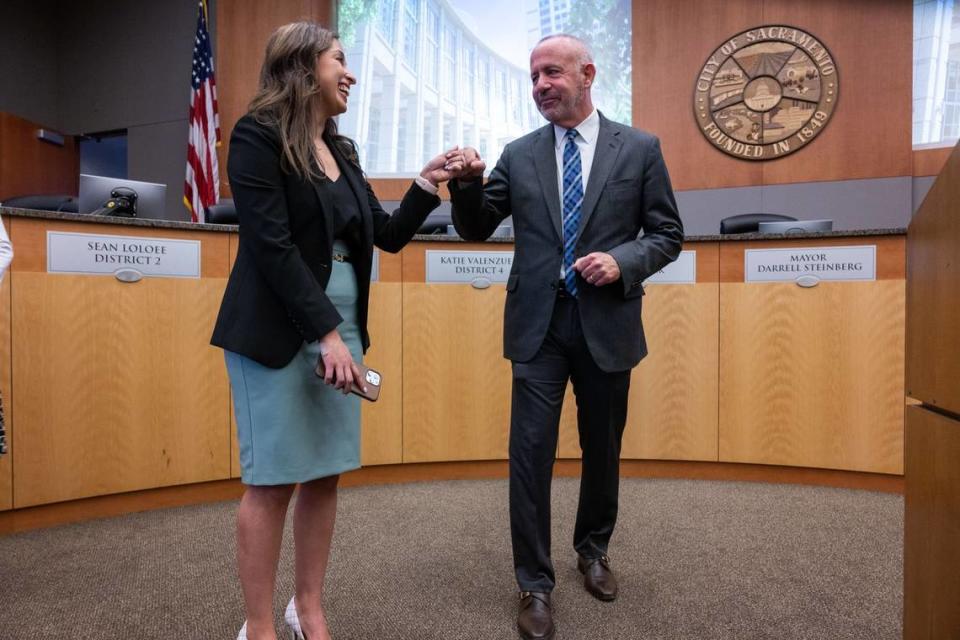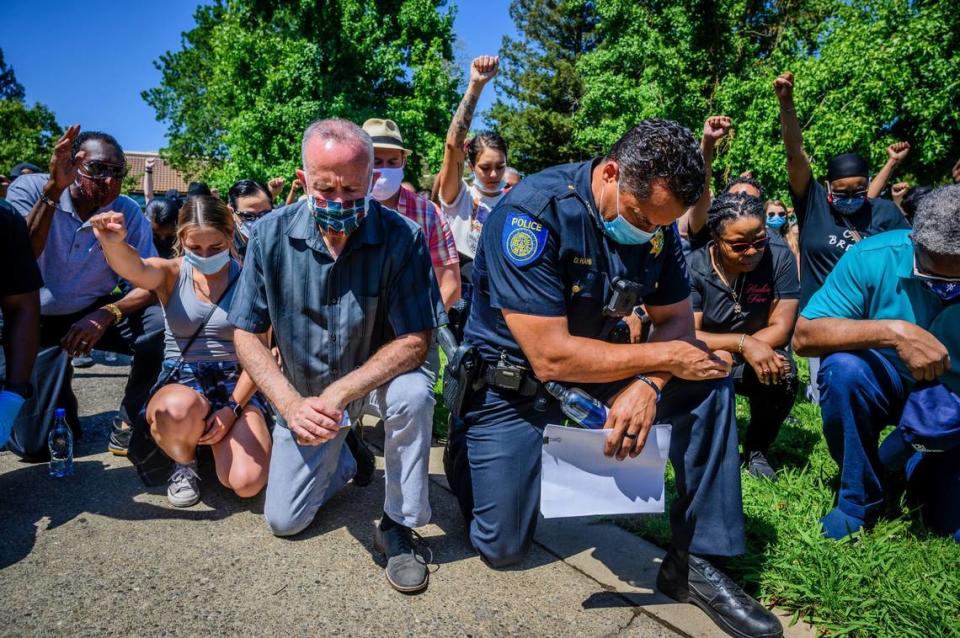Darrell Steinberg is stepping away. But will Sacramento’s mayor ever leave the spotlight?
- Oops!Something went wrong.Please try again later.
Darrell Steinberg already has the look of a man preparing for life outside of public view.
He has a neatly trimmed beard. He arrived at Sacramento City Hall one day last week without socks. And in interviews and at public events, he speaks whimsically about the city’s past and future, as if he’s in a constant state of reflection.
Yet after three decades of holding elected office, the last six years as mayor, it’s impossible to imagine Steinberg disappearing to the tennis club or spending his days sipping coffee at the Starbucks near his Greenhaven home. He is a man in constant motion who in one breath insists he is leaving City Hall to focus on his personal life and in the next says he is contemplating what would be a grueling run for state attorney general in 2026.

Steinberg, 63, announced Thursday that he would not seek re-election next year. He spoke about his decision and his time in office during an hour interview with The Sacramento Bee in his City Hall office, at times speaking uninterrupted in 20-minute chunks. He seemed eager and content to speak about his future, laughing often throughout the interview and delaying eating a salad that sat in front of him.
“It is a happy decision, it’s not an exhausted decision,” he said of his choice not to seek a third term. “It’s not a frustrated decision. It’s a positive decision. And that doesn’t ignore that these last three years have been really challenging.”
Steinberg has pointed out often lately that Sacramento is a young city, one whose trajectory has shifted significantly in the past 15 years. In many ways it has shed its cowtown reputation during Steinberg’s tenure in favor of a growing arts, culture and sports scene.
It’s among the fastest-growing big cities in California. Construction cranes fill the sky in downtown, the Railyards and on the UC Davis Medical Center campus, where a $1.1 billion research and housing hub called Aggie Square is being built. Steinberg’s signature political victory, a sales tax approved by voters in 2018, has poured more than $200 million into neighborhood development, youth programs and the arts.
Many of those accomplishments, and others, likely won’t be finished until years after Steinberg has left office. The city’s challenges, on the other hand, are apparent today.
The city’s homeless population has grown significantly since Steinberg took office and is now larger than San Francisco’s. High-profile crimes, including the shooting death of a 70-year-old man outside an East Sacramento tennis club last year, have rattled many communities. City Council meetings still sometimes descend into chaos, as one did last week when activists clashed with a man who had made antisemitic comments at previous meetings.
Homelessness: Our urgent human crisis
Follow our ambitious, newsroom-wide series examining the growing problem of homelessness across Sacramento and California in 2023, examining government policy, money, addiction, mental health and more.
Steinberg ran for mayor in 2016 after serving as the head of the California state Senate, the second-most powerful political position in the nation’s largest state. He had fought and defeated some of California’s strongest forces, earning a reputation as a skilled negotiator.
But outdueling seasoned lobbyists and governors is one thing. Having to please neighborhood associations and eight City Council members representing vastly different constituencies is something else.
Steinberg sometimes struggled to thread the needle; he was criticized by both conservative business leaders and far left progressives. Plus, the mayoral position in Sacramento’s form of government has limited authority, and Steinberg talked about having to “will” his way to his significant victories.
Steinberg won both his campaigns for mayor in the primaries, both with relative ease. A more difficult fight may have prepared him better for the complexities of governing at the local level.
“I feel like part of a campaign is that it gives you exposure to diverse points of view and how difficult it is to be in local government,” said Councilman Eric Guerra. “(A tougher test) would have given him a better gut sense of the complexities and challenges that have changed since he was a council member (in the 1990s).”
In a sense, Steinberg, like others before him, was no match for the bureaucratic sluggishness and limited resources of City Hall. And he acknowledges that at times he probably promised too much – and that his aspirations set him up for criticism.
“I think maybe I could have … I’ve enjoyed it, don’t get me wrong, I really have enjoyed it,” he said. “I love coming to work every day, I’ve had lots of happy moments. I think I could have enjoyed the role even more and worried a little bit less about what I can’t control.”
That is particularly true on the most pressing issue facing Sacramento. Under Steinberg’s watch, Sacramento added more than 1,000 shelter beds and has devoted unprecedented resources to addressing homelessness. It is building more affordable housing than just about any big city in California. Steinberg secured money for teams of outreach and service workers, and was instrumental in getting Sacramento County to finally work with the city on the crisis.

Still, there is barely a corner of Sacramento that is void of a homeless camp. What was once largely an American River Parkway or downtown problem is now evident throughout the city’s 108 neighborhoods.
“The fact that the problem has gotten worse – it’s not my fault and yet on the other hand people are going to hold me accountable,” Steinberg said. “OK, that’s life, I accept that. It’s been difficult. But I have literally willed my way and our way to greater progress.”
A defining issue
After he entered office, Steinberg secured funding and the political will to open the city’s first large shelter, on Railroad Drive in North Sacramento. Under his watch the city opened three more large shelters across the city, despite a lack of funding and “not in my backyard” neighborhood opposition. His ability to persuade the council to vote how he wanted on homelessness continued for several years, until December 2021, when his attempt to get the city to stop towing vehicles used by the homeless as shelter failed 6-3.
When three new council members were sworn in in December 2022, it seemed Steinberg had the votes he needed to get more people off the streets.
“Mayor, all the progressive things that you’ve been wanting to do, this is your council right here, mayor,” Councilwoman Mai Vang said at a December council meeting after three new members were sworn in, while the audience applauded. “I’m saying right now. So, you want to get things done, you got the council to do it right now ... I’m excited!”
“I’m excited too,” Steinberg said in response. “Love it!”

But in the six months since, the council has not voted to open any new shelter spaces. City Council meeting agendas have not had many items of substance this year, despite the eagerness expressed by the new members and public complaints by Councilwoman Katie Valenzuela that items aren’t getting heard. Steinberg and City Manager Howard Chan are the only two people with the power to place items directly on the agenda.
Steinberg said the work to open more shelter beds is going on behind the scenes.
“I’m not pressing less hard but I’m trying to press less hard in public,” he said.
Bob Erlenbusch of the Sacramento Regional Coalition to End Homelessness praised Steinberg for his efforts to address the crisis, but noted his efforts seem to have slowed.
“I’d like for him to be much more proactive in his remaining time than in his first six months of a new City Council because we need his leadership, and quite frankly, his skill at raising money, particularly from the state of California,” Erlenbusch said.
To find the money for new shelters, Erlenbusch encouraged the council to reduce police funding.
Following the Minneapolis police killing of George Floyd, Steinberg created a new city department to handle nonviolent 911 calls. At the time, he said the change would remove at least $10 million from the police budget by 2022. That has not happened. Since the Floyd protests died down, Steinberg, who has received campaign contributions from the police union, has not publicly taken action to reduce police funding.

Keyan Bliss, a member of the city’s community police review commission, said Steinberg should follow through with his promise to reduce at least $10 million from the police budget in order to open more shelters.
“Actions speak louder than words,” said Bliss. “When the attention dies down there doesn’t seem to be follow up. He’s not some powerless weak mayor as he tried to portray in the (strong mayor ballot measure campaign). He is former speaker pro tempore of the California Senate. He has a wide array of powerful connections from private sector to public sector that he could’ve easily mustered to make sure the things he said and the directions he was giving could actually be fulfilled. He has an opportunity to do that now that he’s not running for re-election. What has he got to lose?”
The next mayor
No Sacramento mayor has served three terms. Steinberg’s predecessor, Kevin Johnson, declined to seek a third term in 2016 after prior allegations of sexual abuse resurfaced against him during his final year in office. Former Mayor Heather Fargo was seeking an unprecedented third term when she was defeated by Johnson in 2008.
Steinberg likely faced the clearest path to a third term. Sacramento is ruled by the Democratic Party establishment, and most of the political elite likely would have deferred to Steinberg and sat out the 2024 race had he run again.
“I’m confident I could win a third term,” Steinberg said.
Instead, with Steinberg backing away, next year’s election is setting up to be the most competitive mayoral race in the city’s history.
Assemblyman Kevin McCarty, also a former City Councilman, announced he is running Thursday just moments after Steinberg told reporters he would not seek re-election. Flojaune Cofer, who established herself as a prominent social justice advocate during the racial reckoning of the summer of 2020, announced in April she is running, and she’ll likely attempt to appeal to the city’s growing base of progressive voters.
Former Council members Steve Hansen and Jeff Harris have both set up campaign accounts for potential mayoral runs. Maggy Krell, a state prosecutor and former district attorney candidate, is running. And Richard Pan, who succeeded Steinberg in the state senate, is also said to be considering a run.
Steinberg has not endorsed a successor. He has advice for whoever occupies the office next, and a word of caution.
“Be fierce and determined,” he said. “Know what you’re walking into and set more reasonable expectations from the very beginning.”
“And enjoy it,” he added, “because it is fun to be mayor.”

